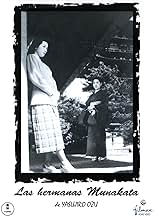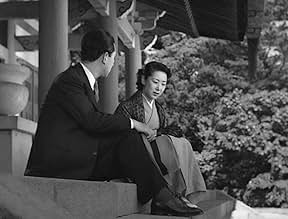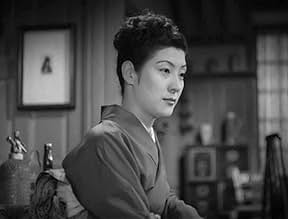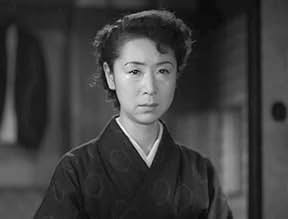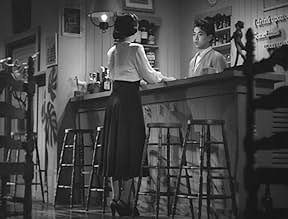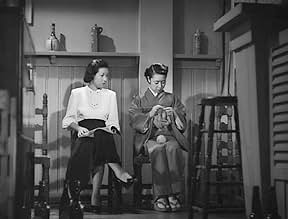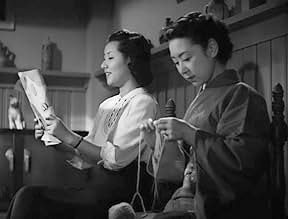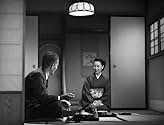CALIFICACIÓN DE IMDb
7.3/10
1.3 k
TU CALIFICACIÓN
Setsuko vive un matrimonio infeliz con Mimura, un ingeniero alcohólico y desempleado. Su hermana Mariko intenta reunirla con Hiroshi, un antiguo amor que ha regresado de Francia, a pesar de ... Leer todoSetsuko vive un matrimonio infeliz con Mimura, un ingeniero alcohólico y desempleado. Su hermana Mariko intenta reunirla con Hiroshi, un antiguo amor que ha regresado de Francia, a pesar de que ella también lo ama.Setsuko vive un matrimonio infeliz con Mimura, un ingeniero alcohólico y desempleado. Su hermana Mariko intenta reunirla con Hiroshi, un antiguo amor que ha regresado de Francia, a pesar de que ella también lo ama.
- Premios
- 2 premios ganados en total
- Dirección
- Guionistas
- Todo el elenco y el equipo
- Producción, taquilla y más en IMDbPro
Argumento
¿Sabías que…?
- TriviaThis was the first film made by star actress Kinuyo Tanaka after her triumphant months-long visit to the United States. Allegedly, Tanaka, from her recent contacts with Hollywood actors, was full of new ideas about acting, which she was not shy about sharing with her director, Ozu. The latter, who held his own very strong (and very un-Hollywood) ideas about acting, was reportedly not pleased by this, and relations between the two during filming were thus somewhat tense.
- ConexionesFeatured in El Encanto del Erizo (2009)
Opinión destacada
The Munekata Sisters is possibly the most obscure film in writer/director Yasujiro Ozu's postwar filmography. But it doesn't deserve to be, because it's actually a great comedy-drama that should have a wider audience.
The film revolves around the relationship between older sister Setsuko (Kinuyo Tanaka) and her younger sibling Mariko (Hideko Takamine). Setsuko is more reserved and adheres to traditional Japanese values, while Mariko embraces modern trends and enjoys sassing people. Naturally, their personality differences bring them into conflict.
Takamine gives a fantastic and genuinely funny performance as Mariko, which is light-years different from the reserved heroines played by Setsuko Hara in Ozu's more acclaimed films. She does funny voices, sticks out her tongue, and even dismissively flicks a suit of samurai armor. (I assume that's a big no-no in polite society.) Yet underneath all this joking is a sensitive character who loves her older sibling, despite their obvious personality clashes.
By contrast, it's initially easy to overlook Tanaka as Setsuko. But as the film goes on, Setsuko's struggle with a loveless marriage starts to dominate the plot, and her character becomes compelling.
Speaking of the plot, it contains more romantic melodrama and unexpected twists than usual for Ozu - possibly because it's based on a serialized story, rather than an original creation. But Ozu directs it with his usual sensitivity and prevents the material from becoming corny or saccharine. Ozu also makes effective use of his graceful transitional or "pillow" shots in this film, which are even more beautifully composed than usual.
Some viewers (understandably) dislike the film's unusual ending. I won't spoil it here, but suffice to say that I actually liked it, and indeed thought it was the most honest way to resolve the story. Ultimately, this film is about two sisters who are very different people but very committed to each other, and the ending does justice to their relationship and its place in the story.
I was a fan of Ozu for 20 years before I bothered to check this out - because, who ever talks about The Munekata Sisters? (Its lack of U. S. availability didn't help, but it's on the Criterion Channel now.) Imagine my surprise when I discovered that this is a witty, wise movie that rounds out Ozu's filmography quite nicely. It's not an all-time great like Late Spring, sure, but a movie doesn't need to be a legendary classic to be awesome.
The film revolves around the relationship between older sister Setsuko (Kinuyo Tanaka) and her younger sibling Mariko (Hideko Takamine). Setsuko is more reserved and adheres to traditional Japanese values, while Mariko embraces modern trends and enjoys sassing people. Naturally, their personality differences bring them into conflict.
Takamine gives a fantastic and genuinely funny performance as Mariko, which is light-years different from the reserved heroines played by Setsuko Hara in Ozu's more acclaimed films. She does funny voices, sticks out her tongue, and even dismissively flicks a suit of samurai armor. (I assume that's a big no-no in polite society.) Yet underneath all this joking is a sensitive character who loves her older sibling, despite their obvious personality clashes.
By contrast, it's initially easy to overlook Tanaka as Setsuko. But as the film goes on, Setsuko's struggle with a loveless marriage starts to dominate the plot, and her character becomes compelling.
Speaking of the plot, it contains more romantic melodrama and unexpected twists than usual for Ozu - possibly because it's based on a serialized story, rather than an original creation. But Ozu directs it with his usual sensitivity and prevents the material from becoming corny or saccharine. Ozu also makes effective use of his graceful transitional or "pillow" shots in this film, which are even more beautifully composed than usual.
Some viewers (understandably) dislike the film's unusual ending. I won't spoil it here, but suffice to say that I actually liked it, and indeed thought it was the most honest way to resolve the story. Ultimately, this film is about two sisters who are very different people but very committed to each other, and the ending does justice to their relationship and its place in the story.
I was a fan of Ozu for 20 years before I bothered to check this out - because, who ever talks about The Munekata Sisters? (Its lack of U. S. availability didn't help, but it's on the Criterion Channel now.) Imagine my surprise when I discovered that this is a witty, wise movie that rounds out Ozu's filmography quite nicely. It's not an all-time great like Late Spring, sure, but a movie doesn't need to be a legendary classic to be awesome.
- WeeClaude
- 27 ene 2024
- Enlace permanente
Selecciones populares
Inicia sesión para calificar y agrega a la lista de videos para obtener recomendaciones personalizadas
- How long is The Munekata Sisters?Con tecnología de Alexa
Detalles
Taquilla
- Total a nivel mundial
- USD 332
- Tiempo de ejecución1 hora 52 minutos
- Color
- Mezcla de sonido
- Relación de aspecto
- 1.37 : 1
Contribuir a esta página
Sugiere una edición o agrega el contenido que falta

Principales brechas de datos
What is the English language plot outline for Las hermanas Munakata (1950)?
Responda
